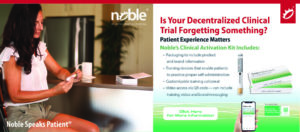Since first breaking into the training device market, Noble has expanded its range of products and services to include many facets of the patient experience. From training device Instructions for Use (IFUs) to product launch strategy programs and patient training videos, Noble has continued to keep patients at the forefront of our mission, as the global leader in medical device training solutions, patient onboarding strategies and multisensory product development for the world’s top pharmaceutical brands.
As we continue to expand, Noble is thrilled to be taking on a critical role in improving clinical trial efficiency through clinical trial support offerings. Before new treatments can reach the clinic, they must be tested in clinical trials to see if they are safe and effective. Clinical trials help improve and advance medical care; they provide factual evidence that can be used to innovate and improve patient care. However, trials that do not enroll enough participants present roadblocks for advancing care to the clinic because they offer little to no scientific insight. Therefore, ensuring robust patient enrollment while minimizing costs and waste must be a high priority.
The onset of the COVID-19 pandemic marked the rise of remote health. Now, even two years later, remote trials—often called virtual or decentralized trials—are here to stay. However, even with greater convenience, remote clinical trials often lack patient confidence. For patients, it is not uncommon for fear and anxiety to occur from participating in a trial, especially if a device is involved. This causes them to become emotionally overwhelmed during their early injections.

Thankfully, Noble can provide these patients with the resources and support to help them achieve better health outcomes, even through the clinical trials process. With Noble’s “Clinical Activation Kit”, clinical trials that require an injection device can help minimize patient burden and by gaining experience and building confidence before using and actual drug device. This is done by using a reusable demonstration device found in the kit that contains no liquid or needle. This kit contains a reusable demonstration device that contains no liquid or needle that helps patients gain experience and build confidence before using an actual drug delivery device.
Noble’s primary focus has always been to make patients the center of everything we do because the patient experience matters; and clinical trials are no exception. In an effort to help improve the outcomes of clinical trials, Noble is excited to launch their new Clinical Activation Kit— Clinic Trial Kits that address the emotional impacts that remote trials often bear on patients. These kits include resettable training devices that help patients practice the correct self-administration process while overcoming their anxieties. They also include access to videos that can be customized with brand messaging and clinical trial instructions.
Indeed, patient confidence and preparedness can prove to be a major stakeholder in the efficiency and effectiveness of clinical trials. By providing patients with the resources they need, Noble’s Clinical Activation Kits help your brand optimize the outcomes of your next clinical trial while helping to improve brand and clinical trial communications, while reducing patient burden and maximizing the patient experience.
